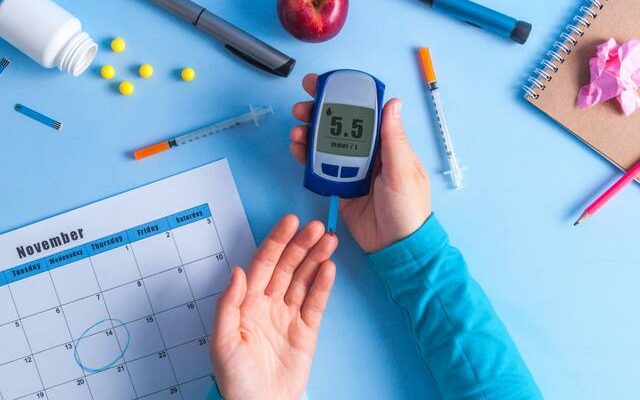With symptoms of diabetes type 2 diabetes Have you been diagnosed with diabetes? Worried you have diabetes and don’t know what to do? Diabetes, a chronic health condition that affects millions of people worldwide, is characterized by high levels of glucose in the blood.
What is Type 2 Diabetes? What are the symptoms of Type 2 Diabetes?
Diabetes mellitus, known as diabetes mellitus in medical literature, is the general name for diseases that affect the use of sugar levels in the blood. Sugar, or glucose, is of vital importance in human health. Glucose, which is the energy source of cells that form tissues and muscles, is also a necessary source for the brain.
Addressing the issue of type 2 diabetes symptoms, Büyük Anadolu Hospitals Academic Director, General Surgery Specialist Professor Doctor Mustafa Şahin said, “Diabetes symptoms are not always apparent in men and women. However, it generally causes symptoms such as taste changes in the mouth, weakness, fatigue, loss of appetite, itching, and delayed healing of wounds.”
What are the Risk Factors for Diabetes?
General Surgery Specialist Professor Doctor Mustafa Şahin, who also provided information about risk factors for diabetes, answered the question, “What causes diabetes?” by saying that factors such as genetic predisposition, being overweight, age, sedentary lifestyle, high blood pressure, high cholesterol and/or high triglyceride levels, and unhealthy diet are important risk factors for diabetes.
What are the harms of diabetes to the body?
Diabetes is a disease that can affect many systems in the body and cause various complications. High blood glucose levels can damage organs and tissues over time. Here are the main damages that diabetes causes to the body:
- Cardiovascular Health: Diabetes increases the risk of heart disease and stroke. High blood sugar causes the arteries to harden and narrow, which accelerates the development of atherosclerosis. This increases the risk of heart attack and stroke.
- Kidney Damage (Nephropathy): Long-term high blood sugar can damage the small blood vessels in the kidneys, causing kidney function to deteriorate. If left uncontrolled, diabetic nephropathy can progress to kidney failure, necessitating a kidney transplant or dialysis.
- Eye Damage (Retinopathy): Diabetes can damage the tiny blood vessels in the eyes, leading to diabetic retinopathy. This can lead to vision loss and even blindness. People with diabetes also have an increased risk of glaucoma and cataracts.
- Nerve Damage (Neuropathy): High blood sugar can cause nerve damage. Diabetic neuropathy causes pain, numbness, and tingling, especially in the legs and feet. Nerve damage can also affect the digestive system, urinary tract, and heart function.
- Foot Problems: Diabetic neuropathy and vascular problems can make it harder for foot wounds to heal and increase the risk of infection. If left untreated, these wounds can lead to gangrene and even amputation.
- Skin Problems: Diabetes can lead to skin problems such as skin infections, fungal infections, and itching. Also, people with diabetes are more likely to experience skin blisters and similar complications.
- Weakened Immune System: High blood sugar levels weaken the immune system, reducing the body’s resistance to infections. People with diabetes are more likely to have urinary tract infections, skin infections, and respiratory tract infections.
- Tooth and Gum Problems: Diabetes can also affect oral health. High blood sugar levels increase the risk of gum disease and can damage the bone and tissue around the teeth.
These complications caused by diabetes can be largely prevented or managed with early diagnosis and appropriate treatment. Regular monitoring of blood sugar levels, healthy eating, regular exercise and doctor’s follow-up are the most effective ways to minimize the damage that diabetes can do to the body.
The Spread of Diabetes Throughout the World
Diabetes, one of the most common chronic diseases in society, is diagnosed in approximately 560,000 people each year. Approximately 95% of these patients have type 2 diabetes. Diabetes is a growing health problem in Turkey. According to data from the Turkish Endocrinology and Metabolism Association (TEMD), the prevalence of diabetes in Turkey is around 14%. This is well above the world average.
Diabetes is generally more common in older age groups. The prevalence of diabetes reaches 20% in individuals over the age of 40. The incidence of Type 1 diabetes is higher in children and adolescents. Approximately 3,500 children are diagnosed with Type 1 diabetes each year in Turkey. Diabetes is one of the main causes of cardiovascular diseases, kidney failure, blindness and lower extremity amputations in Turkey. A large number of diabetic individuals face these complications because they do not receive regular follow-up and treatment.

How Can I Get Rid of Diabetes?
“Diabetes If you are wondering “how is it treated? Is it possible to treat type 2 diabetes?” you should know that treatment is possible. Monitoring blood sugar and medications play an important role in diabetes treatment. In addition, controlling weight with a properly prepared type 1 and type 2 diabetes nutrition list and monitoring blood sugar are also important in this process.
- Healthy eating: Type 1 and type 2 diabetes diets must include whole grain foods, fruits and vegetables. These patients should also pay attention to low-fat foods that are rich in fiber. Animal products and sweets are also foods that should be avoided.
- Physical Activity: It is important to exercise at regular intervals because blood sugar is lowered by exercise and transported to cells to be used for energy.
- Type 1 and Type 2 Diabetes Treatment: In the treatment initiated with symptoms of type 1 diabetes, insulin injections or an insulin pump are used. In addition, blood sugar is checked at frequent intervals and carbohydrate counting is performed. In the treatment initiated with symptoms of type 2 diabetes, blood sugar is basically monitored. In addition, diabetes medications are used.
- Insulin Therapy: Most type 1 diabetics need to use insulin to survive. Some type 2 diabetics also need this treatment. In this treatment, insulin is injected with a pen or syringe.
- Artificial Pancreas or Closed Loop Insulin Delivery System: It is one of the new treatments developed for diabetes. In this treatment, a glucose monitor is added to the insulin pump. When this monitor indicates the need, the device distributes the necessary amount of insulin.
- Gestational Diabetes Treatment: Blood sugar levels should be controlled for the healthy development of the unborn baby and to prevent complications that may occur during pregnancy. Therefore, the mother is given a healthy diet program and regular exercise is recommended. In addition, blood sugar is monitored and in some cases insulin is used.
Type 2 diabetes is a medical disease, but if left uncontrolled, it can cause stroke-related deaths, 1 diabetic foot case every 30 seconds, blindness and kidney failure. Don’t let diabetes reduce your quality of life and get rid of diabetes as soon as possible! Take a step towards a healthy life with the diabetes treatment offered under the leadership of Büyük Anadolu Hospitals Academic Director, General Surgery Specialist Professor Doctor Mustafa Şahin.
For More Information and Details: https://www.buyukanadoluhastanesi.com/

